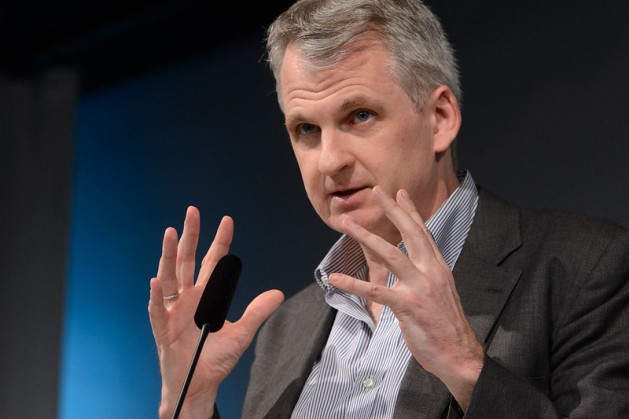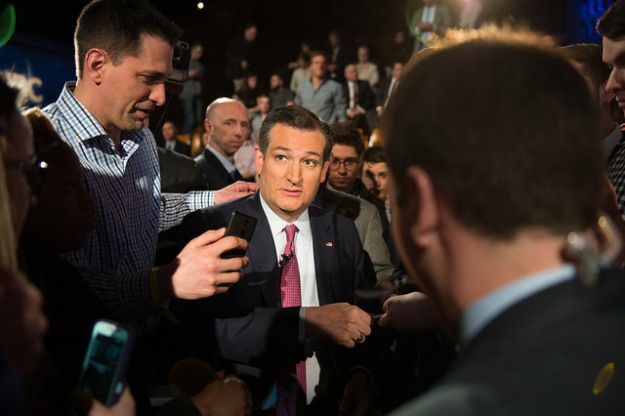
John Kasich in New Hampshire earlier this year. Photo (cc) by Michael Vadon.
Previously published at WGBHNews.org.
Tuesday night’s Republican presidential debate was a useful reminder — as if I needed one — that these events are not being staged for my benefit.
Late in the proceedings, John Kasich put the finishing touches on what I thought was a strong performance by name-checking the conservative Catholic theologian Michael Novak in arguing that the free-enterprise system needs to be “underlaid with values.” No, I haven’t read Novak, but I was intrigued. Earlier, Kasich had what I thought was an effective exchange with Donald Trump over immigration. (The Washington Post has published a transcript here.)
To check in with the conservative media today, though, is to learn that some on the right think Kasich all but disqualified himself.
“Kasich espoused positions that can charitably be called compassionate conservatism, less kindly mini-liberalism of the sort that he says he practiced so successfully in Ohio when ‘people need help,’” writes the economist Irwin M. Stelzer at The Weekly Standard. Adds Paul Mirengoff of Powerline: “John Kasich annoyingly kept demanding speaking time. He used some of it to remind everyone that he’s the least conservative candidate in the field.”
A neutral analyst, Boston Globe political reporter James Pindell, thinks Chris Christie’s strong showing in the unwatched (by me, anyway) undercard makes him a good bet to replace Kasich in future debates. Kasich, Pindell notes, “backed increasing the minimum wage, bailing out big banks, and allowing 11 million illegal immigrants to stay in the country. It is hard to see how many Republicans will go along with the sentiment.”
Clearly Kasich — a top lieutenant in Newt Gingrich’s conservative revolution of the mid-1990s — has been recast as a hopeless RINO. And the notion that he might be the most appealing candidate the Republicans could put up against Hillary Clinton is apparently not nearly as interesting to conservative stalwarts as his heterodox views, summarized by the PBS NewsHour.
As the debate opened, all eyes were on the moderators. Would they manage to avoid the anti-media controversies that befell the CNBC panelists a couple of weeks ago while still managing to maintain a firm hand? My answer is that they partially succeeded. They avoided the snarky, disrespectful tone of the CNBC debate, and the candidates responded with a substantive discussion of the issues.
But on several occasions the panelists were just too soft. One example was Neil Cavuto’s exchange with Ben Carson in which he tried to press Carson on questions that have been raised about his truthfulness. Carson didn’t really answer, and before you knew it he was off and running about Benghazi.
Cavuto’s follow-up: “Thank you, Dr. Carson.”
Then there was the rather amazing question Maria Bartiromo asked Rubio toward the end of the debate, which I thought was well described by Max Fisher of Vox:
https://twitter.com/Max_Fisher/status/664292269554438144
Who won? After each of these encounters, the pundits keep telling us that Rubio is on the move. And yes, the Florida senator has risen in the polls, though he’s still well behind Trump (who informed us that he and Vladimir Putin are “stablemates”) and Carson.
But Rubio’s over-rehearsed demeanor may not wear well. I thought his weakest moment on Tuesday came when Rand Paul challenged him on military spending. The audience liked Rubio’s militaristic response. Paul, though, appeared to be at ease as he offered facts and figures, while Rubio just seemed to be sputtering talking points.
As for Jeb Bush, well, the consensus is that he did better than he had previously, but not enough to make a difference. “He may have stopped the free fall,” writes Jennifer Rubin, The Washington Post’s conservative blogger, “but he was outshone once again by competitors.” The questions about Bush’s continued viabililty will continue.
Carly Fiorina turned in another in a series of strong performances. But they don’t seem to be helping her much in the polls, and there was nothing that happened Tuesday night to make me think that’s going to change.
John Dickerson of Slate, who is also the host of CBS News’ Face the Nation, seems to believe the race will ultimately come down to Rubio’s mainstream conservatism and the much-harder-edged version offered by Ted Cruz, who once again showed he’s a skilled debater.
If that’s the case, let’s get on with it. Tuesday night’s event featured eight candidates — a bit more manageable than the previous three debates, but still too large to sustain a coherent line of thought. (What was that about Michael Novak again, Governor Kasich?)
For that to happen, though, Trump and Carson are going to have to fade. And despite months of predictions (including some by me) that their support would collapse, they remain at the top of the heap. As long as that’s the case, Rubio versus Cruz means precisely nothing.
“The Democrats are laughing,” Cruz said at one point in response to a question about immigration. In fact, the Republicans have given their rivals plenty of comedic material during in 2015. The question is whether that will change in 2016 — or if Hillary Clinton will be laughing all the way to Election Day.






